鲁教版(五四制)九年级全册Unit 4 I like music that I can dance to. Section B 1a~2e课件(共29张PPT)
文档属性
| 名称 | 鲁教版(五四制)九年级全册Unit 4 I like music that I can dance to. Section B 1a~2e课件(共29张PPT) |
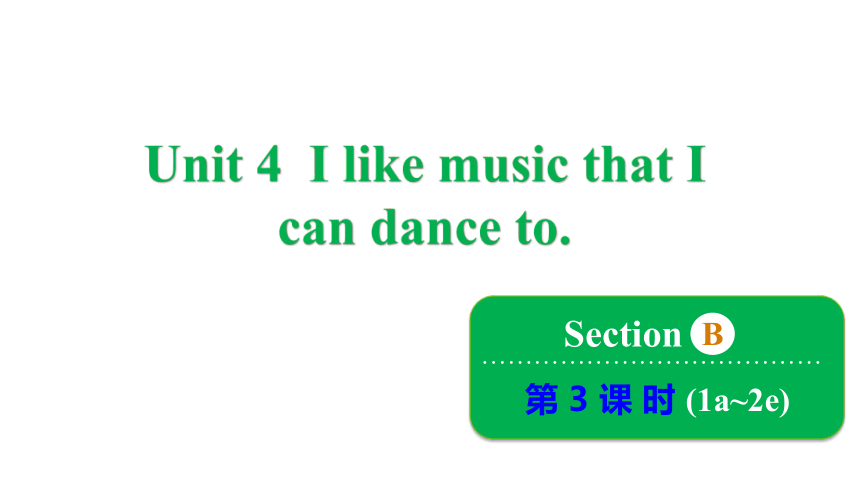
|
|
| 格式 | pptx | ||
| 文件大小 | 650.8KB | ||
| 资源类型 | 教案 | ||
| 版本资源 | 鲁教版 | ||
| 科目 | 英语 | ||
| 更新时间 | 2024-05-02 00:00:00 | ||
图片预览

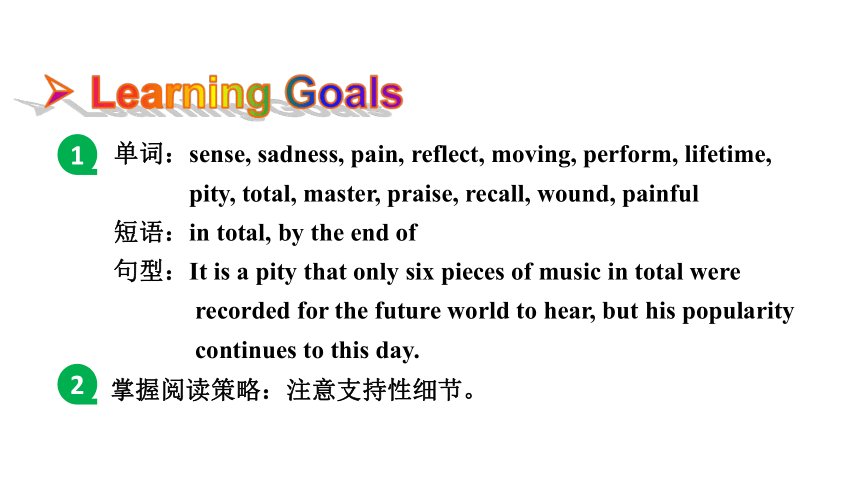
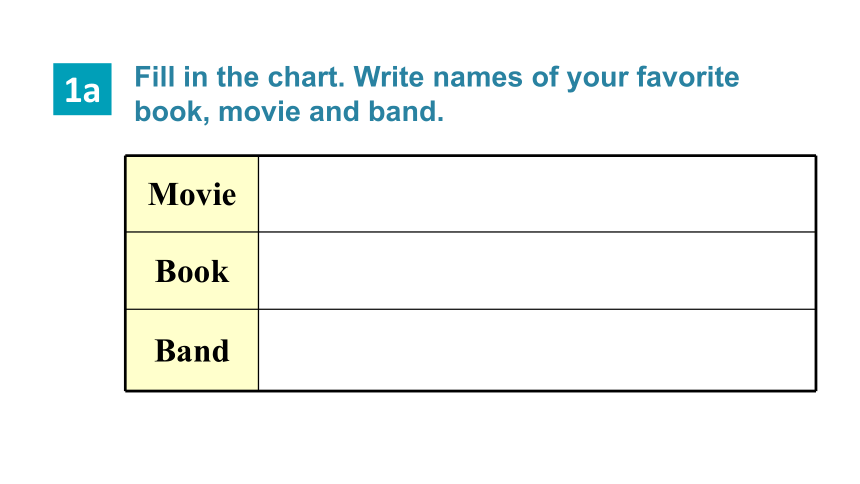
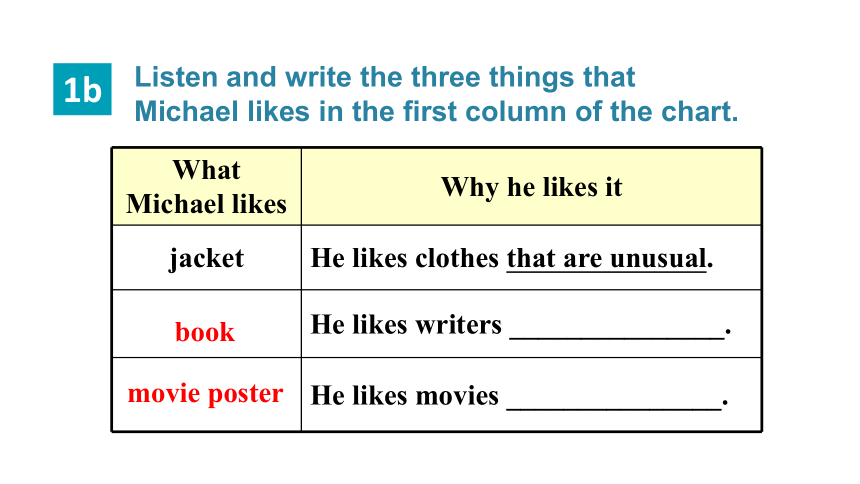
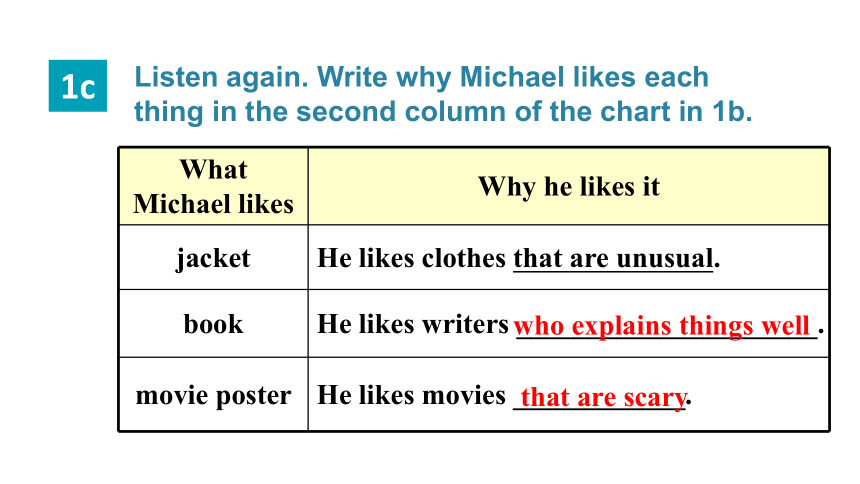
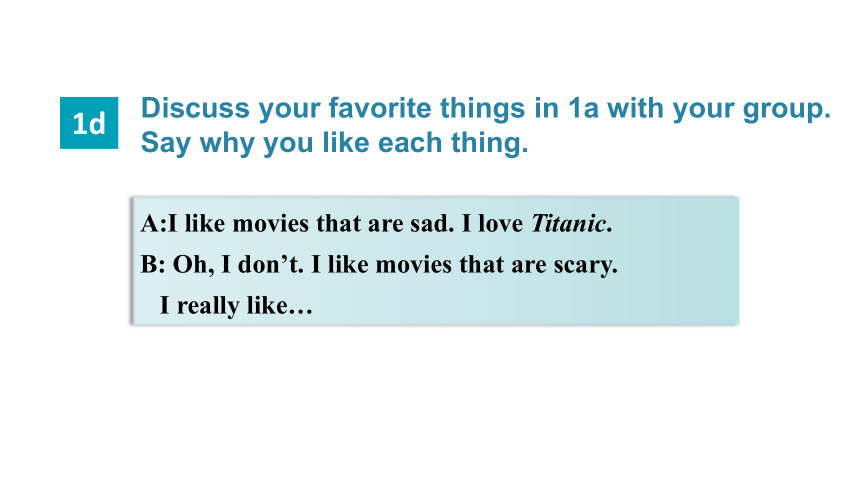
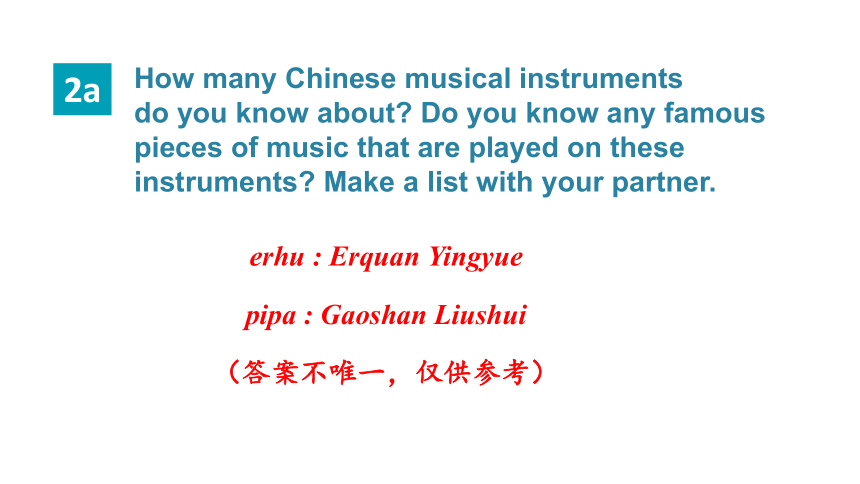
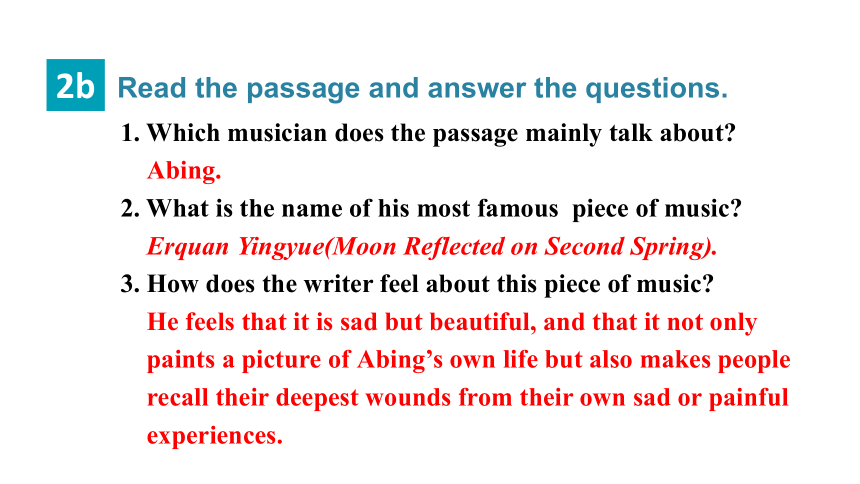
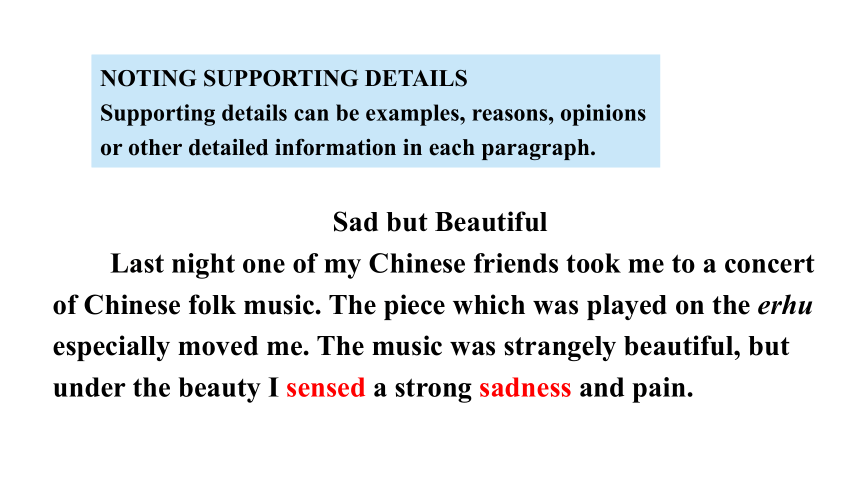
文档简介
(共29张PPT)
Section
第 3 课 时 (1a~2e)
…………………………………
B
Unit 4 I like music that I can dance to.
Learning Goals
1
单词:sense, sadness, pain, reflect, moving, perform, lifetime,
pity, total, master, praise, recall, wound, painful
短语:in total, by the end of
句型:It is a pity that only six pieces of music in total were
recorded for the future world to hear, but his popularity
continues to this day.
掌握阅读策略:注意支持性细节。
2
Fill in the chart. Write names of your favorite
book, movie and band.
1a
Movie
Book
Band
Listen and write the three things that
Michael likes in the first column of the chart.
1b
What Michael likes Why he likes it
jacket He likes clothes that are unusual.
He likes writers _______________.
He likes movies _______________.
book
movie poster
1c
What Michael likes Why he likes it
jacket He likes clothes that are unusual.
book He likes writers _____________________.
movie poster He likes movies ____________.
who explains things well
that are scary
Listen again. Write why Michael likes each thing in the second column of the chart in 1b.
Discuss your favorite things in 1a with your group. Say why you like each thing.
1d
A:I like movies that are sad. I love Titanic.
B: Oh, I don’t. I like movies that are scary.
I really like…
How many Chinese musical instruments
do you know about Do you know any famous pieces of music that are played on these instruments Make a list with your partner.
2a
erhu : Erquan Yingyue
pipa : Gaoshan Liushui
(答案不唯一,仅供参考)
Read the passage and answer the questions.
2b
1. Which musician does the passage mainly talk about
Abing.
2. What is the name of his most famous piece of music
Erquan Yingyue(Moon Reflected on Second Spring).
3. How does the writer feel about this piece of music
He feels that it is sad but beautiful, and that it not only
paints a picture of Abing’s own life but also makes people
recall their deepest wounds from their own sad or painful
experiences.
NOTING SUPPORTING DETAILS
Supporting details can be examples, reasons, opinions
or other detailed information in each paragraph.
Sad but Beautiful
Last night one of my Chinese friends took me to a concert of Chinese folk music. The piece which was played on the erhu especially moved me. The music was strangely beautiful, but under the beauty I sensed a strong sadness and pain.
The piece had a simple name, Erquan Yingyue (Moon Reflected on Second Spring), but it was one of the most moving pieces of music that I’ve ever heard. The erhu sounded so sad that I almost cried along with it as I listened. Later I looked up the history of Erquan Yingyue, and I began to understand the sadness in the music.
The music was written by Abing, a folk musician who was born in the city of Wuxi in 1893. His mother died when he was very young. Abing’s father taught him to play many
musical instruments, such as the drums, dizi and erhu, and by age 17, Abing was known for his musical ability. However, after his father died, Abing’s life grew worse. He was very poor. Not only that, he developed a serious illness and became blind. For several years, he had no home. He lived on the streets and played music to make money. Even after Abing got married and had a home again, he continued to sing and play on the streets. He performed in this way for many years.
Abing’s amazing musical skills made him very popular during his lifetime. By the end of his life, he could play over 600 pieces of music. Many of these were written by Abing himself. It is a pity that only six pieces of music in total were recorded for the future world to hear, but his popularity continues to this day. Today, Abing’s Erquan Yingyue is a piece which all the great erhu masters play and praise. It has become one of China’s national treasures. Its sad beauty not only paints a picture of Abing’s own life but also makes people recall their deepest wounds from their own sad or painful experiences.
1. The music was strangely beautiful, but under the
beauty I sensed a strong sadness and pain. 乐曲异常
优美,但是在这种美之下,我感受到了浓浓的哀伤和痛苦。
sense 作及物动词,意为“感觉到;意识到”;作名词,意
为“感觉;意识”。
※ I could sense that something was wrong.
我感觉到有什么事情不对劲。
Language points
图解不同的感觉
sadness 名词,意为“悲伤;悲痛”,其形容词形式为 sad。
※ He bowed his head in shame and sadness.
他羞愧和悲伤得低下了头。
【拓展】英语中一些形容词加后缀-ness 可构成名词:
形容词 名词
dark darkness(黑暗)
happy happiness(幸福)
ill illness(疾病)
kind kindness(善良)
2. …but it was one of the most moving pieces of
music that I’ve ever heard….
但他是我曾听过的最感人的乐曲之一。
※ It’s a moving story, I feel moved.
这是个感人的故事,我很感动。
moving 动人的,令人感动的 常指事物本身具有“动人的”这一特征,多说明事物,在句中可知表语或定语
moved 感动的 常说明人受到感动,是人的感受,多修饰或说明人
3. Even after Abing got married and had a home again,
he continued to sing and play on the streets.
即便在婚后又有了家,阿炳也继续在街上唱歌、演奏。
get married 意为“结婚”,表示动作,不能与表示一段时
间的状语连用。married 作形容词,意为“已婚的;结婚
的”。marry 作动词,意为“结婚”,表示动作,不能与表
示一段时间的状语连用。
※ Lucy and Peter got married last week.
露西和彼得上周结婚了。
4. By the end of his life, he could play over 600 pieces of
music. 晚年时,他能够演奏超过 600 首曲子。
by the end of 意为“到……结束时;在……之前”。by 作介
词,意为“不迟于;在……之前”。
by the end of 意为“到……结束时;在……之前”,一般指时间。后接表示将来的时间,句子用一般将来时;后接表示现在的时间,句子用现在完成时;后接表示过去的时间,句子用过去完成时
at the end of 意为“在……尽头(末端);在……结束时”,后可接地点或时间名词
in the end 意为“最后;终于”,与 finally、at last 是近义表达
※ By the end of next month, I will finish reading this book.
到下个月末,我才能读完这本书。
※ You will find the hospital at the end of the road.
在路的尽头,你将会找到那家医院。
※ In the end, we all decided to go together.
最后,我们都决定一起去。
5. It is a pity that only six pieces of music in total were
recorded for the future world to hear…可惜的是,总共
只有 6 支曲子被记录了下来,使后人能够听到……
it 作形式主语,其中 that 引导的是主语从句,是本句真正的
主语。pity作名词,意为“遗憾”,其前通常加不定冠词 a。
其用法如下:
(1)It’s a pity(that)... 很遗憾……
※ It’s a pity that my friends can’t stay longer.
我的朋友们不能再多待些时间,真是遗憾。
(2)It’s a pity to do sth. 做某事真可惜。
※ It’s a pity to waste this food. 浪费这些食物真可惜。
(3)What/That’s a pity!真可惜!
※ —I lost my wallet. 我把钱包弄丢了。
—Oh, what a pity!哦,真可惜!
in total 意为“总共;合计”。total 作名词,意为“总数;合计”。
※ There are 400 people in the hall in total.
礼堂里总共有 400 人。
6. Today,Abing’s Erquan Yingyue is a piece which all the
great erhu masters play and praise. 如今,阿炳的《二泉
映月》是一首被所有的二胡大师演奏并高度评价的乐曲。
master 作名词,意为“大师;能手”。master 作名词,还
可意为“主人”;作动词,意为“掌握”。
※ The old man is a master of art. 这位老人是一位艺术大师。
※ Mr. Wang is the master of this big house.
王先生是这所大房子的主人。
※ We need skills to master a new language.
我们需要掌握一门新语言的技巧。
praise 此处用作动词,意为“赞扬;表扬”, praise sb. for(doing)
sth.意为“因(做)某事而赞扬某人”。
※ She praised his cooking. 她称赞他的烹调技术。
※ Tom was praised for his hard work yesterday.
昨天汤姆因努力学习收到了表扬。
【拓展】praise还可用作名词,意为“表扬,赞扬”,常用短语用:
in praise of 极力赞美,称赞 sing sb.’s praises 高度赞扬某人
give praise to sb.表扬某热 receive praise from sb.得到某人的称赞
Read the passage again and use suitable words to complete the main idea of each paragraph. Then list the supporting details in each paragraph.
2c
Para. Main idea Supporting details
1 I was ______ by a piece of music named Erquan Yingyue. The music was strangely beautiful...
2 Abing lived a very ______ life.
3 Abing’s musical skills made him very ________.
moved
poor
popular
He lived on the streets and
played music to make money.
Today, Abing’s Erquan Yingyue is a piece which all the great erhu masters play and praise.
Abing played music (that/who) could touch the hearts of people. When we listen to his music, we can _______ both the beauty and the sadness in it. It makes us think about the _______ and ______(that/who) we have experienced in the past. For this reason, many people _______
him as the musician who has greatly influenced erhu music. So it is
really a _______ that not many pieces of his music were recorded.
Circle that or who and fill in the blanks with the words in the box.
2d
pain wounds sense pity praise
sense
wounds
pain
praise
pity
Student A is a foreign visitor who is interested in Abing and his music. Student B is a Chinese student who knows about Abing. Use the information in the passage to make a conversation.
2e
A: What kind of musical instruments did
Abing play?
B: He could play many instruments, but he
is best known for playing the erhu.
1. He sensed her deep _________(sad).
2. The old man has many ________(move) experiences.
3. I don’t want to recall the ___________(pain) memory.
4. His face was r__________ in the mirror.
5. The nurse is cleaning the __________(伤口)carefully.
6. The children _________(表演) two plays each school year.
sadness
moving
painful
Ⅰ.根据句意和提示填写单词
Practice
eflected
wound
perform
1. The girl _______________ you saw at the meeting is a good swimmer.
2. The town ___________ we visited a few years ago is much larger than
before.
3. April 1st is a day ____________ is called April Fools’ Day.
4. The girl ___________ often helps me with my English is from No. 8 Middle
School.
who/whom/that
which/that
which/that
who/that
Ⅱ.用that, who, whom 或 which填空
1. 我一生中去过那里三次。
I have been there for three times _______ ____ _______.
2. 那儿总共大约有40人。
There’re about 40 people there __ _____.
3. 他们去年结的婚。
They_____ ________ last year.
4. 他没有接受那份工作真是遗憾。
___ __ _____ that he didn’t accept the job.
during the lifetime
in total
got married
It’s a pity
Ⅲ.根据汉语意思完成句子
Section
第 3 课 时 (1a~2e)
…………………………………
B
Unit 4 I like music that I can dance to.
Learning Goals
1
单词:sense, sadness, pain, reflect, moving, perform, lifetime,
pity, total, master, praise, recall, wound, painful
短语:in total, by the end of
句型:It is a pity that only six pieces of music in total were
recorded for the future world to hear, but his popularity
continues to this day.
掌握阅读策略:注意支持性细节。
2
Fill in the chart. Write names of your favorite
book, movie and band.
1a
Movie
Book
Band
Listen and write the three things that
Michael likes in the first column of the chart.
1b
What Michael likes Why he likes it
jacket He likes clothes that are unusual.
He likes writers _______________.
He likes movies _______________.
book
movie poster
1c
What Michael likes Why he likes it
jacket He likes clothes that are unusual.
book He likes writers _____________________.
movie poster He likes movies ____________.
who explains things well
that are scary
Listen again. Write why Michael likes each thing in the second column of the chart in 1b.
Discuss your favorite things in 1a with your group. Say why you like each thing.
1d
A:I like movies that are sad. I love Titanic.
B: Oh, I don’t. I like movies that are scary.
I really like…
How many Chinese musical instruments
do you know about Do you know any famous pieces of music that are played on these instruments Make a list with your partner.
2a
erhu : Erquan Yingyue
pipa : Gaoshan Liushui
(答案不唯一,仅供参考)
Read the passage and answer the questions.
2b
1. Which musician does the passage mainly talk about
Abing.
2. What is the name of his most famous piece of music
Erquan Yingyue(Moon Reflected on Second Spring).
3. How does the writer feel about this piece of music
He feels that it is sad but beautiful, and that it not only
paints a picture of Abing’s own life but also makes people
recall their deepest wounds from their own sad or painful
experiences.
NOTING SUPPORTING DETAILS
Supporting details can be examples, reasons, opinions
or other detailed information in each paragraph.
Sad but Beautiful
Last night one of my Chinese friends took me to a concert of Chinese folk music. The piece which was played on the erhu especially moved me. The music was strangely beautiful, but under the beauty I sensed a strong sadness and pain.
The piece had a simple name, Erquan Yingyue (Moon Reflected on Second Spring), but it was one of the most moving pieces of music that I’ve ever heard. The erhu sounded so sad that I almost cried along with it as I listened. Later I looked up the history of Erquan Yingyue, and I began to understand the sadness in the music.
The music was written by Abing, a folk musician who was born in the city of Wuxi in 1893. His mother died when he was very young. Abing’s father taught him to play many
musical instruments, such as the drums, dizi and erhu, and by age 17, Abing was known for his musical ability. However, after his father died, Abing’s life grew worse. He was very poor. Not only that, he developed a serious illness and became blind. For several years, he had no home. He lived on the streets and played music to make money. Even after Abing got married and had a home again, he continued to sing and play on the streets. He performed in this way for many years.
Abing’s amazing musical skills made him very popular during his lifetime. By the end of his life, he could play over 600 pieces of music. Many of these were written by Abing himself. It is a pity that only six pieces of music in total were recorded for the future world to hear, but his popularity continues to this day. Today, Abing’s Erquan Yingyue is a piece which all the great erhu masters play and praise. It has become one of China’s national treasures. Its sad beauty not only paints a picture of Abing’s own life but also makes people recall their deepest wounds from their own sad or painful experiences.
1. The music was strangely beautiful, but under the
beauty I sensed a strong sadness and pain. 乐曲异常
优美,但是在这种美之下,我感受到了浓浓的哀伤和痛苦。
sense 作及物动词,意为“感觉到;意识到”;作名词,意
为“感觉;意识”。
※ I could sense that something was wrong.
我感觉到有什么事情不对劲。
Language points
图解不同的感觉
sadness 名词,意为“悲伤;悲痛”,其形容词形式为 sad。
※ He bowed his head in shame and sadness.
他羞愧和悲伤得低下了头。
【拓展】英语中一些形容词加后缀-ness 可构成名词:
形容词 名词
dark darkness(黑暗)
happy happiness(幸福)
ill illness(疾病)
kind kindness(善良)
2. …but it was one of the most moving pieces of
music that I’ve ever heard….
但他是我曾听过的最感人的乐曲之一。
※ It’s a moving story, I feel moved.
这是个感人的故事,我很感动。
moving 动人的,令人感动的 常指事物本身具有“动人的”这一特征,多说明事物,在句中可知表语或定语
moved 感动的 常说明人受到感动,是人的感受,多修饰或说明人
3. Even after Abing got married and had a home again,
he continued to sing and play on the streets.
即便在婚后又有了家,阿炳也继续在街上唱歌、演奏。
get married 意为“结婚”,表示动作,不能与表示一段时
间的状语连用。married 作形容词,意为“已婚的;结婚
的”。marry 作动词,意为“结婚”,表示动作,不能与表
示一段时间的状语连用。
※ Lucy and Peter got married last week.
露西和彼得上周结婚了。
4. By the end of his life, he could play over 600 pieces of
music. 晚年时,他能够演奏超过 600 首曲子。
by the end of 意为“到……结束时;在……之前”。by 作介
词,意为“不迟于;在……之前”。
by the end of 意为“到……结束时;在……之前”,一般指时间。后接表示将来的时间,句子用一般将来时;后接表示现在的时间,句子用现在完成时;后接表示过去的时间,句子用过去完成时
at the end of 意为“在……尽头(末端);在……结束时”,后可接地点或时间名词
in the end 意为“最后;终于”,与 finally、at last 是近义表达
※ By the end of next month, I will finish reading this book.
到下个月末,我才能读完这本书。
※ You will find the hospital at the end of the road.
在路的尽头,你将会找到那家医院。
※ In the end, we all decided to go together.
最后,我们都决定一起去。
5. It is a pity that only six pieces of music in total were
recorded for the future world to hear…可惜的是,总共
只有 6 支曲子被记录了下来,使后人能够听到……
it 作形式主语,其中 that 引导的是主语从句,是本句真正的
主语。pity作名词,意为“遗憾”,其前通常加不定冠词 a。
其用法如下:
(1)It’s a pity(that)... 很遗憾……
※ It’s a pity that my friends can’t stay longer.
我的朋友们不能再多待些时间,真是遗憾。
(2)It’s a pity to do sth. 做某事真可惜。
※ It’s a pity to waste this food. 浪费这些食物真可惜。
(3)What/That’s a pity!真可惜!
※ —I lost my wallet. 我把钱包弄丢了。
—Oh, what a pity!哦,真可惜!
in total 意为“总共;合计”。total 作名词,意为“总数;合计”。
※ There are 400 people in the hall in total.
礼堂里总共有 400 人。
6. Today,Abing’s Erquan Yingyue is a piece which all the
great erhu masters play and praise. 如今,阿炳的《二泉
映月》是一首被所有的二胡大师演奏并高度评价的乐曲。
master 作名词,意为“大师;能手”。master 作名词,还
可意为“主人”;作动词,意为“掌握”。
※ The old man is a master of art. 这位老人是一位艺术大师。
※ Mr. Wang is the master of this big house.
王先生是这所大房子的主人。
※ We need skills to master a new language.
我们需要掌握一门新语言的技巧。
praise 此处用作动词,意为“赞扬;表扬”, praise sb. for(doing)
sth.意为“因(做)某事而赞扬某人”。
※ She praised his cooking. 她称赞他的烹调技术。
※ Tom was praised for his hard work yesterday.
昨天汤姆因努力学习收到了表扬。
【拓展】praise还可用作名词,意为“表扬,赞扬”,常用短语用:
in praise of 极力赞美,称赞 sing sb.’s praises 高度赞扬某人
give praise to sb.表扬某热 receive praise from sb.得到某人的称赞
Read the passage again and use suitable words to complete the main idea of each paragraph. Then list the supporting details in each paragraph.
2c
Para. Main idea Supporting details
1 I was ______ by a piece of music named Erquan Yingyue. The music was strangely beautiful...
2 Abing lived a very ______ life.
3 Abing’s musical skills made him very ________.
moved
poor
popular
He lived on the streets and
played music to make money.
Today, Abing’s Erquan Yingyue is a piece which all the great erhu masters play and praise.
Abing played music (that/who) could touch the hearts of people. When we listen to his music, we can _______ both the beauty and the sadness in it. It makes us think about the _______ and ______(that/who) we have experienced in the past. For this reason, many people _______
him as the musician who has greatly influenced erhu music. So it is
really a _______ that not many pieces of his music were recorded.
Circle that or who and fill in the blanks with the words in the box.
2d
pain wounds sense pity praise
sense
wounds
pain
praise
pity
Student A is a foreign visitor who is interested in Abing and his music. Student B is a Chinese student who knows about Abing. Use the information in the passage to make a conversation.
2e
A: What kind of musical instruments did
Abing play?
B: He could play many instruments, but he
is best known for playing the erhu.
1. He sensed her deep _________(sad).
2. The old man has many ________(move) experiences.
3. I don’t want to recall the ___________(pain) memory.
4. His face was r__________ in the mirror.
5. The nurse is cleaning the __________(伤口)carefully.
6. The children _________(表演) two plays each school year.
sadness
moving
painful
Ⅰ.根据句意和提示填写单词
Practice
eflected
wound
perform
1. The girl _______________ you saw at the meeting is a good swimmer.
2. The town ___________ we visited a few years ago is much larger than
before.
3. April 1st is a day ____________ is called April Fools’ Day.
4. The girl ___________ often helps me with my English is from No. 8 Middle
School.
who/whom/that
which/that
which/that
who/that
Ⅱ.用that, who, whom 或 which填空
1. 我一生中去过那里三次。
I have been there for three times _______ ____ _______.
2. 那儿总共大约有40人。
There’re about 40 people there __ _____.
3. 他们去年结的婚。
They_____ ________ last year.
4. 他没有接受那份工作真是遗憾。
___ __ _____ that he didn’t accept the job.
during the lifetime
in total
got married
It’s a pity
Ⅲ.根据汉语意思完成句子
同课章节目录
- Unit 1 When was it invented?
- Section A
- Section B
- Unit 2 Teenagers should be allowed to choose their
- Section A
- Section B
- Unit 3 It must belong to Carla.
- Section A
- Section B
- Unit 4 I like music that I can dance to.
- Section A
- Section B
- Unit 5 You’re supposed to shake hands.
- Section A
- Section B
- Unit 6 Sad movies make me cry.
- Section A
- Section B
- Unit 7 Life is full of the unexpected.
- Section A
- Section B
- Unit 8 We're trying to save the earth!
- Section A
- Section B
- Unit 9 It's important to have good habits.
- Section A
- Section B
- Unit 10 I remember meeting all of you in Grade 6.
- Section A
- Section B
